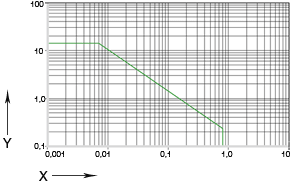Due to their technical characteristics and compliance with applicable regulations, iglidur® A181 plain bearings
are predestined for use in food technology applications. Directly comparable to iglidur® A180 with respect to
temperature and media resistance, iglidur® A181 represents yet another improvement with respect to wear resistance in most applications.
iglidur® A181 - Material data
| Genera l features | Unit | iglidur® A181 | test method |
| Density | g/cm³ | 1,38 | |
| Colour | blue | ||
| Max. humidity absorption at 23°C/50% R. H. | % weight | 0,2 | DIN 53495 |
| Max. water absorption | % weight | 1,3 | |
| Coefficient of surface friction, dynamic, against steel | µ | 0,10 - 0,21 | |
| pv values (dry) | MPa x m/s | 0,31 | |
Mechanical properties |
|||
| Bending E-module | MPa | 1.913 | DIN 53457 |
| Tensile strength at +20 °C | MPa | 48 | DIN 53452 |
| compressive strength | MPa | 60 | |
| Maximum recommended surface pressure (20° C) | MPa | 31 | |
| Shore D-hardness | 76 | DIN 53505 | |
Physical and thermal properties |
|||
| Max. long term application temperature | °C | +90 | |
| Max. short term application temperature | °C | +110 | |
| Minimum application temperature | °C | -50 | |
| thermal / heat conductivity | [W/m x K] | 0,25 | ASTM C 177 |
| Coefficient of thermal expansion (at 23° C) | [K-1 x 10-5] | 11 | DIN 53752 |
Electrical properties |
|||
| Specific forward resistance | Ωcm | < 1012 | DIN IEC 93 |
| surface resistance | Ω | < 1012 | DIN 53482 |
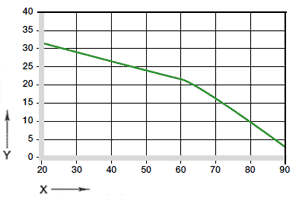
Figure 02: Maximum recommended surface pressure dependent on the temperature (31 MPa to +20 °C)
X = Temperature [°C]
Y = Load [MPa]
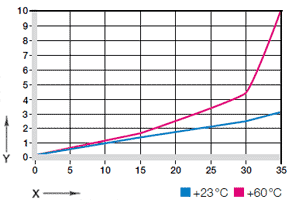
Figure 03: Deformation under load and temperatures
X = Load [MPa]
Y = Deformatio [%]
With increasing temperatures, the compressive strength of iglidur® A181 plain bearings decreases. Fig. 02 clarifies this connection. Maximum recommended surface pressure represents a mechanical material parameter. Tribological conclusions cannot be drawn from it.
Figure 03 shows the elastic deformation of iglidur® A181 with radial loads.
| m/s | Rotary | oscillating | Linear |
| Constant | 0,8 | 0,6 | 3,5 |
| Short-term | 1,2 | 1,0 | 5,0 |
iglidur® A181 is developed for low surface speeds. Maximum speeds up to 0.8 m/s (rotating) and 3.5 m/s (linear) respectively are permitted for continuous application in dry operation. The values specified in Table 02 state the limits to which the long-term permitted temperature rises due to friction heat. In practice these limit values are not always reached due to interactions.
| iglidur® A181 | Application temperature |
| Lower | - 50 °C |
| Upper, long-term | + 90 °C |
| Upper, short-term | + 110 °C |
| Secure axially in addition | + 60 °C |
The upper long-term application temperature of +90°C allows for a variety of applications in the food industry. As Fig. 02 shows, the compressive strength decreases with increasing temperatures. The additional friction heat in the bearing system should be considered in the temperature observations. An additional securing is recommended at temperatures higher than +60°C.
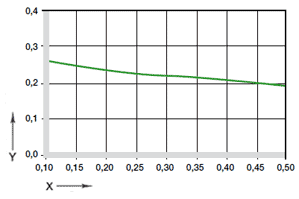
Figure 04: Coefficients of friction dependent on the surface speed, p = 1 MPa
X = Sliding speed [m/s]
Y = Coefficient of friction μ
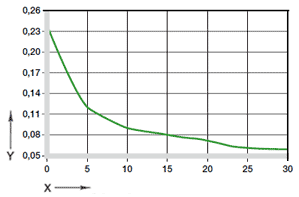
Figure 05: Coefficients of friction dependent on the load, v = 0,01 m/s
X = Load [MPa]
Y = Coefficient of friction μ
Coefficient of friction and wear resistance alter with the application parameters(Fig. 04 and 05). In the iglidur® A181 plain bearings, the alteration of the friction coefficient µ dependent on surface speed and the shaft's surface finish is only negligently pronounced.
| iglidur® A181 | Dry | Grease | Oil | Water |
| Coefficients of friction µ | 0,10 - 0,21 | 0,08 | 0,03 | 0,04 |
Table 04: Coefficients of friction against steel (Ra = 1 µm, 50 HRC)
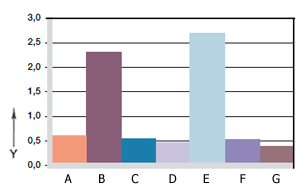
Figure 06: Wear, rotating application with different shaft materials, p = 1 MPa, v = 0,3 m/s
X = Shaft material
Y = Wear [μm/km]
A = Aluminum, hard-anodized
B = machining steel
C = Cf53
D = Cf53, hard chrome-plated
E = St37
F = V2A
G = X90
Figure 06 displays a summary of the results of tests with different shaft materials, which were conducted with iglidur® A181 plain bearings. Special emphasis is given to the corrosion-resistant shaft types in thefood industry. Fig. 06 shows that low wear rates can be achieved especially in combination with these shafts. As in many iglidur® materials, the wear rate increases in rotation with otherwise identical parameters (Fig. 07).
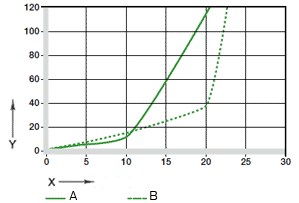
Fig. 07: Wear in oscillating and rotating applications with Cf53 shaft material depending
A = rotating
B = oscillating
on the load
X = load [MPa]
Y = wear [μm/km]
| Medium | Resistance |
| Alcohols | + |
| Hydrocarbons | + |
| Greases, oils without additives | + |
| Fuels | + |
| Diluted acids | 0 to - |
| Strong acids | - |
| Diluted bases | + |
| Strong bases | + to 0 |
All specifications at room temperature[+20 °C]
Table 05: resistant to chemicals
Electrical properties
| Specific forward resistance | < 1012 Ωcm |
| Surface resistance | < 1012 Ω |
iglidur® A181 bearings can be used under various environmental conditions and in contact with numerous chemicals. Table 05 gives an overview of the chemical resistance of iglidur® A181 bearings at room temperature.
iglidur® A181 bearings are radiation resistant up to a radioactive intensity of 2 · 10² Gy.
iglidur® A181 bearings are permanently resistant against UV rays.
In application in vacuum, the potentially existent moisture content is degassed. For this reason only dry bearings are suitable for vacuum.
| Maximum moisture absorption | |
|---|---|
| by +23 °C/50 % r. F. | 0,2 weight-% |
| Max. water absorption | 1,3 weight-% |
The iglidur® A181 bearings absorb up to 0.2% water through atmospheric humidity (+23°C, 50% relative atmospheric humidity), when saturated with water they absorb 1.3%.
| Diameter d1 [mm] |
Shaft h9 [mm] |
iglidur® A181 F10 [mm] |
Housing H7 [mm] |
| Up to 3 | 0 - 0,025 | +0,014 +0,054 | 0 +0,010 |
| > 3 to 6 | 0 - 0,030 | +0,020 +0,068 | 0 +0,012 |
| > 6 to 10 | 0 - 0,036 | +0,025 +0,083 | 0 +0,015 |
| > 10 to 18 | 0 - 0,043 | +0,032 +0,102 | 0 +0,018 |
| > 18 to 30 | 0 - 0,052 | +0,040 +0,124 | 0 +0,021 |
| > 30 to 50 | 0 - 0,062 | +0,050 +0,150 | 0 +0,025 |
| > 50 to 80 | 0 - 0,074 | +0,060 +0,180 | 0 +0,030 |
| > 80 to 120 | 0 - 0,087 | +0,072 +0,212 | 0 +0,035 |
| > 120 to 180 | 0 - 0,100 | +0,085 +0,245 | 0 +0,040 |
Table 07: Important tolerances iaw. ISO 3547-1 after press-fitting.
Iglidur® A181- bearings are standard bearings for shafts with h-tolerance (recommended minimum h9). The bearings are designed for press-fit in a housing with h7 tolerance. After the installation in a housing with nominal diameter, the inner diameter of the bearing automatically adjusts to the E10 tolerance.
More than 100,000 products available! Delivery and consultation Mon-Fri from 7am-8pm and Sat from 8am-12pm!
